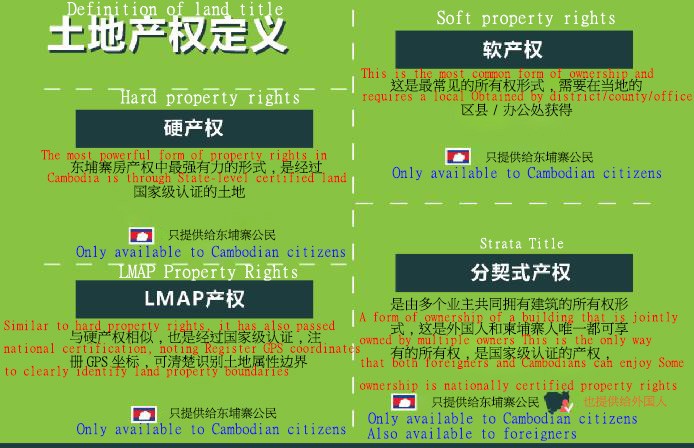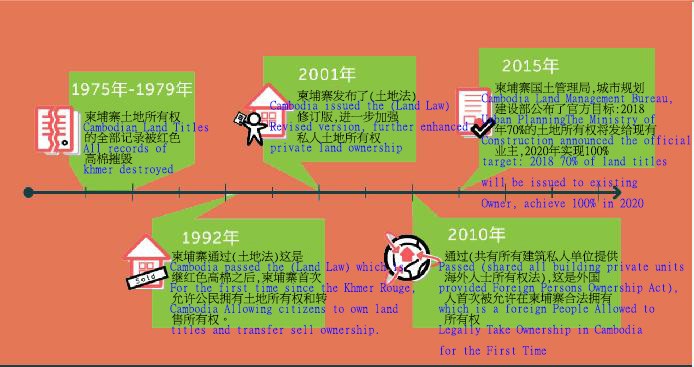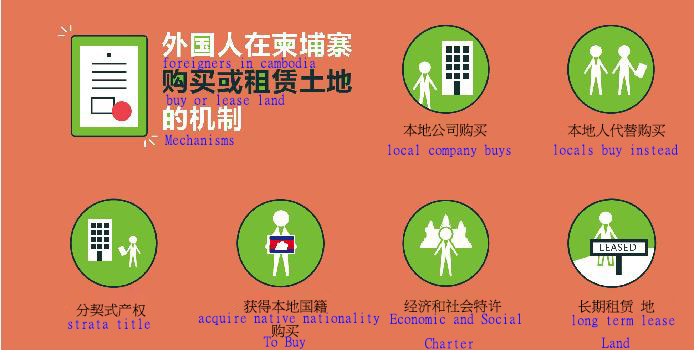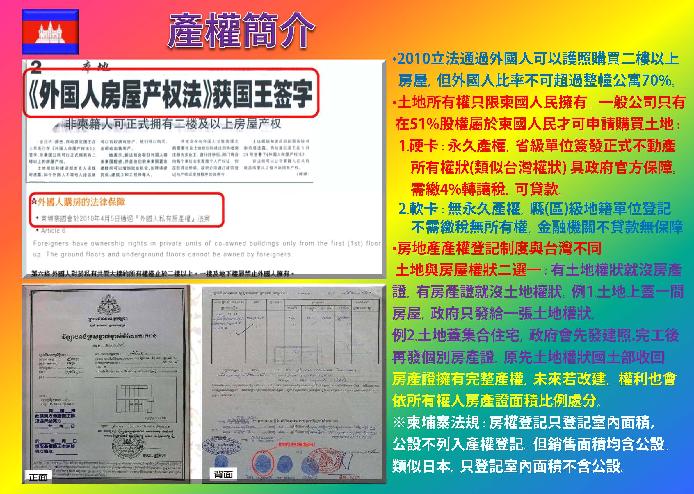|
|
|
||
|---|---|---|---|
柬埔寨土地投資要點
土地具有供給稀缺性和用途多樣性特點,屬於不可再生資源。柬埔寨社會政局穩定,投資環境寬鬆,對外來投資極具吸引力。相對低廉土地價格和永久性土地所有權,更賦予土地升值極大想像空間,土地已經成為外來資金在柬埔寨投資熱點。為使投資者對柬埔寨土地法律法規有基本瞭解,規避投資風險,結合以往的土地投資案例和經驗歸納以下幾點,供投資者參考: 土地所有權 柬埔寨王國境內土地按所有權性質分為國家公有土地和私有土地。國家公有土地包括森林、河道、天然湖泊、河岸、海灘、道路等,個人或公司均不能取得國家公有土地的所有權,也不能以任何形式取得國家公有土地開發權。私有土地分為國家私有和個人私有,國家私有土地可以依據相關子法令進行轉讓、出租或特許使用;個人私有土地可以自由轉讓、贈予、交換或出租。 投資土地主體資格 依據柬埔寨王國《土地法》,只有柬埔寨籍自然人或柬埔寨籍公司法人才有資格持有土地所有權。一個在柬埔寨註冊的公司,其不低於51%股份由柬埔寨籍自然人股東或柬埔寨籍法人股東持有,該公司法人才能依法被認定具有柬埔寨籍。外國投資者要想取得柬埔寨土地的所有權,必須首先滿足這一主體資格要求。實踐中,外國投資者可以採用“投資移民”的方式申請取得柬埔寨國籍或者採用適當的股權架構設計成立柬埔寨籍公司法人。 土地所有權檔 如前所述,投資者購買目標土地必須是私有性質土地。目前柬埔寨私有土地所有權檔包括軟土地證和硬土地證兩種。軟土地證由一系列檔構成,這些檔由土地所在地村長、鄉長簽字證明。軟土地證僅在縣(區)級地籍委員會登記,不是正式的土地所有權憑證。軟證土地不能用於銀行抵押貸款,但軟證土地目前在柬埔寨佔有很大的比例,特別是農業用地。硬土地證是由土地所在地省級地籍委員簽發正式不動產所有權狀。 投資者購買軟證土地時,應首先將軟土地證過戶到投資者名下,然後再向省級地籍委員會申請硬土地證。申請將軟土地證轉換為硬土地證需要向地籍管理部門繳納一定的費用,具體繳費標準按土地具體位置確定,此種費用可由土地買賣雙方協商承擔。如果投資者購買的是硬證土地,需要按土地協定轉讓價格繳納4%不動產轉讓稅,不動產轉讓稅也是土地買賣雙方自協商承擔。在土地交易過程中,定金、地價款支付方式都是由買賣雙方自行協商確定的,柬埔寨法律對此並沒有強制性規定。 土地租賃、土地特許 除取得土所有權外,投資者也可以通過租賃、特許權方式取得土地開發使用權。土地租賃期限最長為50年,租賃期限15年以上為長期租賃,長期租賃土地協議可以在地籍委員會進行登記。特許土地年限最長為99年,但柬埔寨政府自2012年起已經暫停批准新的特許地。 投資土地前期調查 無論購買或租賃土地,建議投資者對目標土地進行前期調查。調查內容包括土地所有權現狀、土地所有權限制、所有權瑕疵、土地規劃等內容,充分前期調查可以規避土地投資風險。 文章提供/北京雨仁律師事務所 薑學明
Key Points of Land Investment in Cambodia
property The land in the Kingdom of Cambodia is divided into state-owned land and private land according to the nature of ownership. State-owned land includes forests, rivers, natural lakes, river banks, beaches, roads, etc. Individuals or companies cannot obtain ownership of state-owned land, nor can they obtain the right to develop state-owned land in any form. Private land is divided into state private land and individual private land. State private land can be transferred, leased or licensed according to relevant sub-statutes; individual private land can be freely transferred, gifted, exchanged or leased. Qualifications for investing in land According to the Land Law of the Kingdom of Cambodia, only Cambodian natural persons or Cambodian corporate legal persons are eligible to hold land ownership. A company registered in Cambodia, whose shares are not less than 51% held by Cambodian natural person shareholders or Cambodian legal person shareholders, can be legally recognized as having Cambodian nationality. In order for foreign investors to acquire ownership of Cambodian land, they must first meet this subject qualification requirement. In practice, foreign investors can apply for Cambodian citizenship by means of "investment immigration" or use appropriate equity structure design to establish a Cambodian company legal person. land title file As mentioned earlier, the target land purchased by investors must be private land. At present, Cambodia's private land ownership files include soft land certificates and hard land certificates. The soft land certificate consists of a series of documents, which are signed by the head of the village and township where the land is located. The soft land certificate is only registered with the county (district) level cadastre committee and is not a formal land ownership certificate. Land with soft certificates cannot be used for bank mortgages, but land with soft certificates currently occupies a large proportion in Cambodia, especially agricultural land. The hard land certificate is a formal real estate ownership certificate issued by the provincial cadastre committee where the land is located. When an investor purchases land with a soft certificate, he should first transfer the soft land certificate to the name of the investor, and then apply for a hard land certificate to the provincial cadastre committee. To apply for converting the soft land certificate into a hard land certificate, you need to pay a certain fee to the cadastral management department. The specific payment standard is determined according to the specific location of the land. This kind of fee can be borne by the buyer and seller of the land through negotiation. If the investor buys hard-certified land, he needs to pay 4% real estate transfer tax based on the land agreement transfer price, and the real estate transfer tax is also borne by the land buyer and seller through self-negotiation. In the process of land transactions, the payment method of deposit and land price is determined by the buyer and seller through negotiation, and there is no mandatory regulation in Cambodian law. land lease, land concession In addition to obtaining land ownership, investors can also obtain land development and use rights through leases and concessions. The land lease term is up to 50 years, and the lease term is more than 15 years as a long-term lease. The long-term lease land agreement can be registered with the cadastral committee. The maximum lease term is 99 years, but the Cambodian government has suspended approval of new concessions since 2012. Preliminary survey of investment land Regardless of buying or leasing land, investors are advised to conduct preliminary investigations on the target land. The survey content includes the status quo of land ownership, land ownership restrictions, ownership defects, land planning, etc. Sufficient preliminary investigation can avoid land investment risks. Article provided by Jiang Xueming, Beijing Yuren Law Firm |
|||
 |
|||
第一章 總則 第一條:本法的目的是提供多業主房屋(公寓)私人部份產權以及使用和享受多業主房屋公眾部分利益的權利給外國人。 第二條:本法的目標如下: -規定所有擁有多業主房屋私人部分產權和享受公眾部分利益外國人的權利與義務以及一般政策,同時規定這些權利註冊的法規。 -為外國人前來柬埔寨王國投資,創造便利的條件。 -為建築領域投資者的商業活動創造便利條件,同時回應柬埔寨王國不動產市場不斷增加的要求。 第三條:本法執行於擁有柬埔寨王國多業主房屋私人部分產權的外國人和柬埔寨王國公民。 第四條:本法所使用的詞句的意思如下: -外國人——指非柬籍的法人或自由人,即使這些人的國籍、宗教信仰或種族不同,完全沒有歧視。 -依法擁有足夠條件的外國人——指合法進入柬埔寨王國,並擁有能力的外國人。 -多業主房屋——指多位業主共同居住的房屋或建築物。多業主房屋某些為每位元業主單獨擁有的部分稱為“私人部分”,某些為所有業主共同擁有的部分稱為“公眾部分”。 -私人部分——指多業主房屋中私人單獨控制和使用的部分。 -私人部分產權擁有者——指對私人部分擁有產權的個人。 -公眾部分——指多業主房屋公眾使用或對所有業主均有利益的部分,例如:土地、樓梯、屋頂、花園、道路、出入口處,共同牆壁和提供公眾服務的地方。 -特別公共產權——指多位外國人和柬埔寨王國公民對一座多業主房屋共同擁有的權利,包括外國人和柬埔寨王國公民對多業主房屋的私人部分和公眾部分擁有的權利。 -特別公共產權者——指擁有特別公共產權的外國人。 -特別整體產權——指多位個人對多業主房屋公眾部分的產權,其中外國人有權利使用和享受公眾部分提供的利益,而柬埔寨王國公民對公眾部分有特別整體產權。 一塊——指與多業主房屋公眾部分連在一起的私人部分,每塊地的價值均不相同,依照私人部分大小而定,必須根據每位元業主擁有私人部分面積而作決定。 第二章 一般政策 第五條:依據法律擁有足夠條件的外國人,對多業主房屋私人部分可擁有產權以及有權使用的享受公眾部分提供的利益,同時有義務遵守本法各條文規定以及現行法律有關規定。 第六條:外國人對多業主房屋一樓以上私人部分可擁有產權,樓下以及更下層則不允許外國人擁有產權。 至於一間多業主房屋私人部分中可作為外國人產權的比例和計算方法,必須由政府法令作規定。 只有多業主房屋私人部分產權才可以提供給私人擁有,至於多業主房屋公眾部分,應該保留給多業主房屋的所有業主共同使用。 在任何情況下,多業主房屋所在地區的土地,不應該作為特別公共產權者的產權。 外國人不能夠擁有離陸地邊界線30公里內的多業主房屋私人部分的產權,除非多業主房屋位於特別經濟區內、重要居民集中區內和柬埔寨王國政府規定的地區內。 在多業主房屋建築在從第三者租賃來的土地上的情況下,外國人像柬埔寨王國公民一樣,可以長期租賃私人部分。 第三章 特別公共產權的規定 第七條:特別公共產權在以下情況下產生、轉讓和改變: -依據法律條文而由有關方面達成協議 -遺產。 第八條:如果沒有依據關於註冊的法律規定進行註冊工作,而進行轉讓特別公共產權,這項轉讓將被認為無效。 第九條:當柬埔寨王國公民的私人部分產權轉讓給外國人時,特別公共產權者獲得私人部分產權和獲得公眾部分的使用和享受公眾部分提供利益的權利而已。在這種情況下,作為前私人部分產權擁有者的柬埔寨王國公民失去了自己對公眾部分的整體產權。 如果私人部分產權擁有者是外國人,並且把自己私人部分產權轉讓給柬埔寨王國公民,作為業主的柬埔寨王國公民應獲得私人部分的產權以及公眾部分的整體產權。 第十條:依據現行法律規定,特別公共產權者的遺產繼承人,應獲得親人遺留下來的權利與義務。 如果由於沒有繼承人或者由於繼承人不肯接受遺產或者依法律規定遺產不能夠分配給任何人,遺產應被作為國家財產。 第十一條:如果有些外國人,在違反本法第六條規定的情況下,獲得或購買得某多業主房屋私人部分,在本法生效後,應被認為該行動無效,而共同行動者應歸還所獲得的產權。 第四章 特別公共產權者的權利與義條 第一部分 特別公共產權者對私人部分的權利與義務 第十二條:在法律規定的面積內,私人部分的特別公共產權者,有權利自由的使用、分配和享受自己所擁有的私人部分所提供的利益。 第十三條:私人部分的特別公共產權者,不能夠使用自己所擁有的私人部分侵犯、阻礙其他私人部分的特別公共產權者的生活。 私人部分的特別公共產權者不能從事任何影響保護多業主房屋的行為或者從事任何與管理或使用多業主房屋利益相違背的行為。 第十四條:多業主房屋私人部分的特別公共產權者與柬籍業主有同樣的義務。特別公共產權者應該遵守現行法律或多業主房屋內部規章所規定的責任與義務。 第二部分 特別公共產權者對公眾部分的權利與義務。 第十五條:公眾部分應在私人部分產權擁有者所擁有的特別整體產權中。特別公共產權者擁有使用和享受公眾部分所提供利益的權利。 第十六條:由法律承認的特別整體產權和其他附屬權利,不能離開私人部分而單獨的分配、處理和出售。 第十七條:特別公共產權者必須參加保護公眾部分的工作。除非事先有通過協商達成協議或在內部規章中特別規定,否則這項保護工作必須按每塊私人部分的價值的比例而分配。 第十八條:使用和享受公眾部分,所提供利益的權利是不能夠缺少的權利。即使多業主房屋或私人部分消失也好。如果多業主房屋殘破不能夠居住或由於某項原因而損壞或由於政府當局下令拆除,所有業主可以根據內部規章規定或過去所達成的協議或按每塊私人部分的價值按比例負責支出費用修繕或重建。除非在多業主房屋內部規章有特別規定或全體業主達成協議,否則必須按照法律規定和保持房屋原貌的原則進行修繕和重建工作。如果出現多業主房屋由於人為因素或不可抗拒因素全部損壞,而且柬籍業主全體同意出售多業主房屋所位於的地皮的情況,特別公共產權者有權獲得符合自己擁有的私人部分面積比例或者按照前所達成的協議或者內部規章的規定,使用和享受公眾部分所提供利益。 第五章:註冊和發出產權證的法規 第十九條:多業主房屋特別公共產權的註冊和發放產權證的法規和其他有關註冊私人產權證的法規相同。特別公共產權者的產權證圖樣以及關於權利的說明,應遵照國土規劃和建設部部長的公告規定。 第六章 懲罰條例 第廿條:特別公共產權者把多業主業房屋的公眾部分和土地改變成為自己私人或者出售,應被強迫恢復原狀。該特別公共產權者必須受到地政法第257條文規定的懲罰。不肯參加保護公眾部分工作或者不肯遵守公共秩序規定的特別公共產權者,必須受到地政法第258條文規定的懲罰。 第廿一條:如果地政官員在發放多業主房屋和私人部分產權證給特別公共產權者的工作上或註冊工作上,違反了本法各項條文規定,必須依照地政法第264條文規定給予懲罰。 第七章 有關條例 第廿二條:所有在本法生效前購買或獲得多業主房屋私人部分而不符合本法第6條規定的外國人,被允許在兩年內進行處理,使之符合本法規定。 如果出現不符合以上第一段的現象,有關部門應向法院提出控告,以便強制出售該多業主房屋的私人部分。 第八章 最後法規 第廿三條:所有與本法精神相違背的法律,應被宣佈無效。 第廿四條:本法應儘快宣佈執行。 |
|||
 |
上一頁Last |
下一頁Next |
TOP |



 .......热点省份代理人 詹经理 Rock Chan
.......热点省份代理人 詹经理 Rock Chan